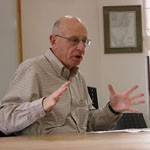
JERUSALEM — Israel’s Coronavirus cases seem to be growing.
It comes in response to increased testing, as well as crowds without masks at several points: outside stadiums (where they are not allowed to cheer inside), in bars and social clubs, some prominent bar mitzvahs, and on streets and the beach.
While some argue that the increased infections reflect increased testing, it seems that increased mixing without masks is also making its contribution.
The Health Ministry continues to call for separations and masks, but Israelis are not well disciplined.
Intercity buses have been crowded, as well as the Jerusalem Light Rail.
Now, finally, the intercity trains are open, with requirements for advanced reservations and limited seating. They’ll be much more restrictive than for intercity buses.
And we’ve been exposed to televised crying by individuals engaged in providing weddings or bar mitzvot, as well as the performers and back stage operators of cultural events.
The government has opened religious observances, such as weddings and bar mitzvot, to 250 guests, and we can assume that they all won’t assure themselves of masks and separation.
And now cultural events will also be open, initially to 250 participants, but with pressure from the Cultural Minister to increase that to a more profitable 500.
This won’t be enough for the big stars, who are saying that they need thousands in the audience in order to pay the bills.
And we can assume that there’ll be crowding, as well as an absence of masks.
Squeaky wheels getting the grease? Or a difficult process of trying to balance the need for the economy to open along with efforts to limit contagion? With a population as likely to ignore as to obey the restrictions.
Our own experience in walking the neighborhood is that about half wear the masks, and half do not, or keep them around their necks perhaps worrying about meeting police with their possibility of getting a ticket worth from 500 to 2000 NIS.
Reports from the US are similar. With 50 states, each having considerable discretion and somewhat different cultures. Along with cities having similar discretion. It’s a mess. Our contacts report that some places are more restrictive, with populations more or less likely to obey the rules.
It isn’t easy to stay masked. Our own experience is to keep the mask in place when encountering others, but then to take it down from the nose and mouth.
We see people covering their mouth but not the nose, which the experts tell us is useless.
There are also sizable sectors where workers–singers, orchestra members, actors, sound personnel, stage hands, cleaners et al — have been out of work since March.
Some may have savings to tide them over, but others may not. Government aid has not been generous, and it hasn’t reached everyone.
El Al has been promised a loan or a government take-over. Hotels, tour bus operators, guides, and others in the tourist industry have been demonstrating. The Prime Minister has met with his Greek counterpart and then talked about opening travel to and from certain countries on August 1, without requiring those entering Israel to undergo two weeks of isolation.
There’s news of increased immigration, from the US and Europe, of individuals thinking it’s better here than there.
A lot of Israel’s cases have been traced to entries from the US who came with it. It’s hard for the Prime Minister to keep that border closed, given the importance of the US government, Donald Trump, and the American Jewish community.
Recently we’ve seen an increase in infections, with debates in the government about freezing the liberties allowed, or even going backwards and reimposing restrictions. As well as lots of calls to wear masks and avoid crowding. But there are pictures of Knesset Members and other worthies who are not obeying the rules.
Lots of tough calls, and lots of limited enforcement.
We hear of several labs testing vaccines, but we’re still several months from being able to be inoculated. Israel has entered the competition to obtain vaccines. As well as for flu. We’ve been warned that there may not be enough for everyone.
It may be a tough winter.
*
Ira Sharkansky is professor emeritus of political science at Hebrew University. He may be contacted via ira.sharkansky@sdjewishworld.com